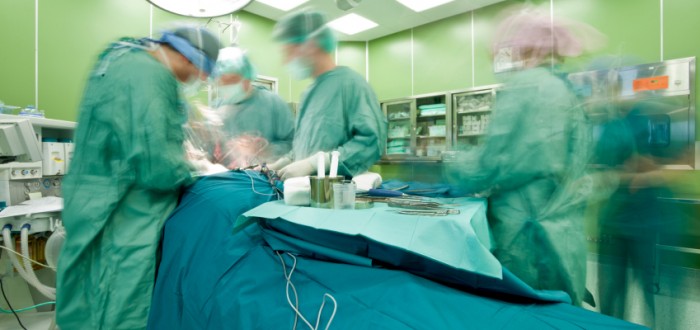Extrapleural pneumonectomy — EPP for short — is a surgery that can really knock the wind out of a mesothelioma patient’s sails.
Because of that, critics of the procedure question whether EPP is even worth the trouble of undergoing. Indeed, recent studies suggest there is little or no benefit to be gained by it — and maybe harm instead.
One such criticism was leveled at EPP by researchers from Britain’s York Teaching Hospital and University College of London a few months ago in the journal Thorax.
In case you’re contemplating having EPP surgery, know that it is a very radical procedure that involves removing the lung lining plus one entire lung-and-diaphragm set.
EPP as a Standard of Care
EPP originated in Britain during the 1970s. Its best-known U.S. advocate is David Sugarbaker, M.D., who refined the procedure two decades later while at Brigham and Women’s Hospital in Boston.
At a number of mesothelioma clinics around our country today, EPP is considered a standard of care for mesothelioma patients. It is often provided as part of a package that includes chemotherapy or radiation therapy or both.
However, EPP critics say they are troubled by how relatively few long-term survivors the surgery seems to produce. They note that EPP mortality and morbidity rates are both distressingly high.
In 2010, critics of EPP found support for their opposition in a Lancet Oncology study of 50 patients with mesothelioma. Divided into three groups, the study’s cohort of patients all received chemotherapy or radiotherapy or both, but only one group of patients also underwent EPP. The findings revealed no benefit from EPP.
Critics point out that EPP might prove a poor bet for most mesothelioma patients because the procedure is punishing for those in less than good physical condition. Unfortunately, most mesothelioma victims are in sub-par condition by the time they receive a diagnosis.
Embracing an Alternative to EPP
Not surprisingly then, some doctors who disfavor EPP have chosen to embrace a less-radical surgical variation called EP/D — extended pleurectomy/decortication.
EP/D entails stripping out the lung lining, as in an EPP, but leaving behind the lung and diaphragm. Doctors who perform EP/D feel it’s a safer surgery that delivers results comparable to EPP and makes breathing more comfortable for patients.
Meanwhile, critics contend that EP/D needs to be validated, the same as EPP. A small clinical trial scheduled to get underway soon in Britain will seek to do just that. And if the results appear promising, the investigators will then organize a much larger EP/D validation study.
The Journal of Thoracic Oncology in 2012 took an initial stab at validating EP/D by comparing EP/D results against those obtained for EPP patients. The investigators examined records for 3,000 patients who had one or the other procedure and found that the outcomes were about the same for patients with stage II and stage III mesothelioma.
However, many of the stage I patients who received EPP actually lived about 18 months longer than the stage I patients who received EP/D.
EPP Critics Becoming More Outspoken
Still, EPP critics think the surgery is premised on a badly flawed idea. And they’re increasingly less hesitant to say so. For example, at the 2014 European Lung Cancer Conference in Geneva, one prominent critic declared EPP dangerous and not at all beneficial.
Of course, proponents of EPP aren’t taking any of this laying down on the operating table. They insist the surgery is viable and important for appropriate patients.
EPP critics do concede there are sometimes impressive success stories with EPP. But they wonder if those success stories would have been any less successful had the patients gone some other route – perhaps opting for a less-radical surgery, or just chemotherapy, radiation or both.
Until the controversy is resolved one way or the other, critics advise that anyone contemplating EPP should only undergo the surgery if it is conducted in conjunction with a clinical trial.
In other words, treat EPP as if it is still an experimental procedure.

